The Association for Data-Driven Marketing and Advertising (ADMA) welcomed Australia’s marketing elite to Sydney’s Sofitel Sydney Wentworth for its annual Global Forum.
This year’s theme was ‘Elevate for the Future’ and brought in local and international speakers to share valuable insights, interesting case studies, thought-provoking ideas and outlooks for the industry with Holly Ransom, founder and CEO of Emergent, as master of ceremonies for the day.
Check out Mediaweek’s recap of the ADMA Global Forum highlights below.
Andrea Martens – “No one says what is ahead is easy, but it is an opportunity for marketers to reset”
Andrea Martens, ADMA CEO, opened the day by reflecting on two challenges looming over the industry, Regulatory Reform and the Capability Crisis, and how ADMA aims to “reimagine and enable the marketing industry of the future, with data at its core.”
She also reflected on the theme ‘Elevate for the Future’ and said: “It’s more than just adapting; it’s about leading the charge in positively transforming our industry.
“Elevate means making conscious choices, knowing how to prioritise what will deliver the best for our teams, our companies and the communities we serve.
“To me personally – elevate materialises when there is a level of confidence that risk has been mitigated, within the frameworks we operate and the team’s we build; when optimisation isn’t just clear but it’s understood and innovation unfurls! It’s a great feeling – but it takes serious work.”
“No one says what is ahead is easy, but it is an opportunity for marketers to reset and Elevate our discipline at every level within the business and across the industry,” she added.
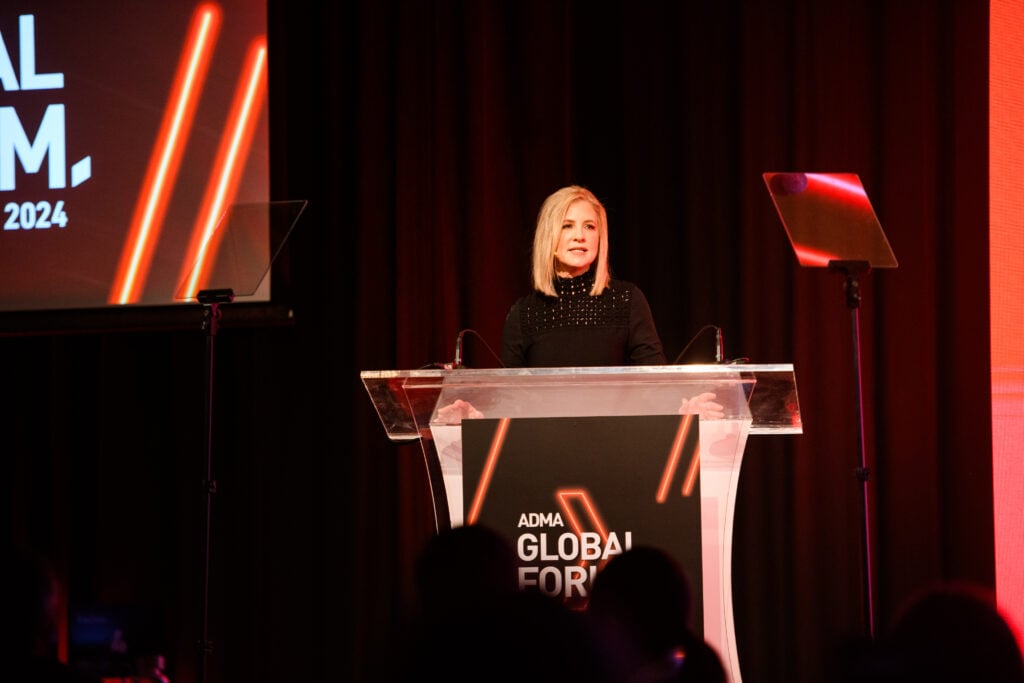
Andrea Martens
Tom Goodwin – “It’s only when you really rethink your job that things profoundly change”
Tom Goodwin, industry leader and co-founder of innovation consultancy All We Have Is Now, centered his presentation around the rapidly evolving landscape of business and technology, with a focus on prioritizing customer-centricity in marketing.
He emphasised the importance of focusing on small changes that matter, while also highlighting the need for a more strategic approach to digital marketing. He suggested actions such as marketers experimenting more with AI technologies to better understand capabilities and limitations, while also having honest conversations about which metrics actually matter versus vanity metric being optimized for.
He told ADMA attendees to rethink assumptions about jobs and use technology as a lever for more ambitious thinking rather than just efficiency.
“You have an ability to take a step back and rethink many of the assumptions that you make about the way you do your job,” he said.
“It’s only when you really rethink your job that things profoundly change.”
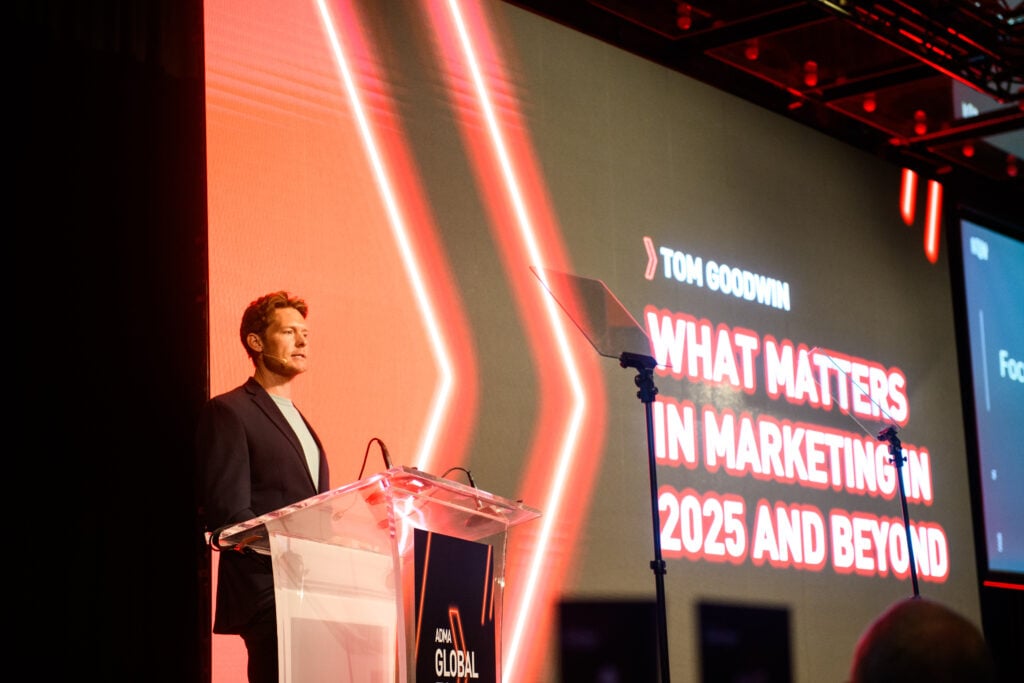
Tom Goodwin
Scott Galloway
Scott Galloway, professor of marketing at NYU’s Stern School of Business and a serial entrepreneur, joined ADMA’s Global Forum from Chicago. He shared his predictions trends, which revolved around the challenges faced by traditional cable and ad-supported media companies, while highlighting the disruption and opportunity created by platforms such as Netflix and TikTok.
He also touched on the potential of AI to revolutionise the retail industry and the need for regulation to prevent misinformation and concentration of power.
He mentioned that traditional media companies should create a consortium to negotiate with AI language models over use of their content and believes companies should have employees learn about and understand AI as it relates to their industry/role.
Sarla Fernando
ADMA’s director of regulatory and advocacy, Sarla Fernando took to the stage to talk the long-awaited privacy reform and what marketers need to know.
Her presentation highlighted the challenges of managing sensitive information and focused on the importance of reflecting developments in technology and data with responsible marketing practices. She also discussed the importance of having a data response plan in place and why businesses should invest in cyber security and privacy training for their marketing teams.
When asked who is responsible for driving work within an organisation on data reform and responsibility, Fernando told with ADMA attendees: “I genuinely think you should start in the marketing team. I think marketing really needs to have a voice in this space.
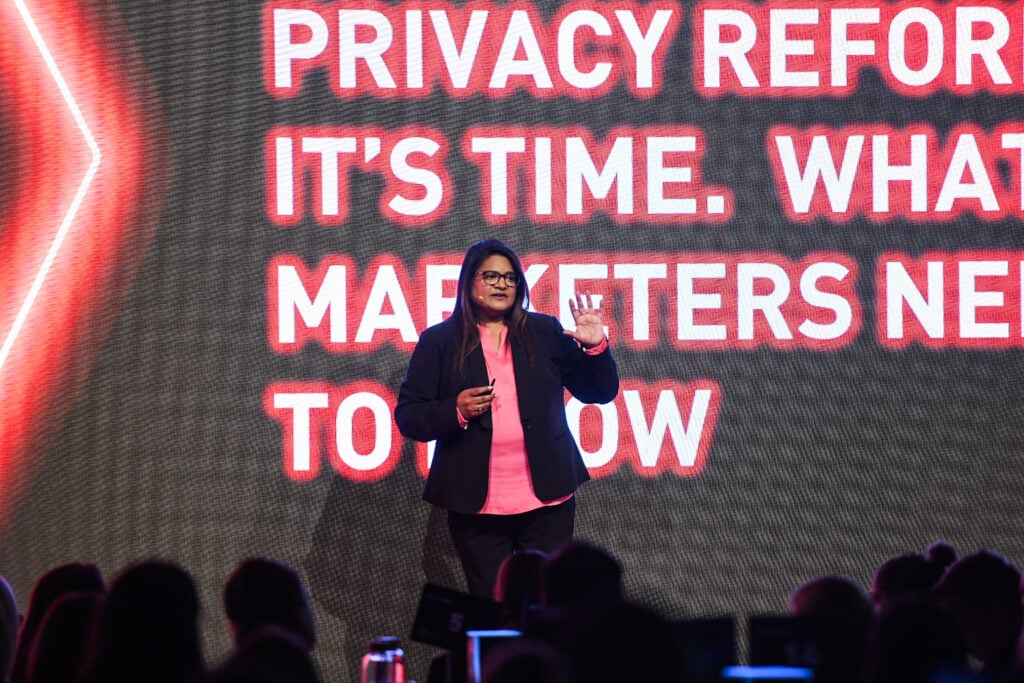
Sarla Fernando
“If you don’t, the decision will be made by the compliance teams, the IT teams, everyone else in government teams,” she said. “If marketing doesn’t speak up and speak to the value of this data, how this data is needed and how it’s going to deliver growth, then we’re not going to have a really broad aspect for the business.
“I think what’s really important is for us to see what’s coming as an opportunity for marketers to have an amnesty. We’ve been doing wrong things for a while. We’ve made mistakes, not on purpose, but it’s an opportunity to get investment from your business, because we have to become compliant. Learn what we need to learn. Start from scratch,” Fernando added.
Panel: Unlocking the power of customer experience
CX panel saw Nine CMO Liana Dubois, Medibank’s chief customer officer Milosh Milisavljevic and Michelle Klein, chief customer and marketing officer at IAG discuss unlocking the power of customer experience.
Coming off the back of the Olympics, Du Bois shared that a learning Nine has taken on board is balancing the combination of live schedules, live streaming and on demand, and getting it right.
She explained that on only a couple of instances differences in time lead to misaligned coverage of certain sports and live events from the main channel that directed audiences to the digital or FAST channels.
“When we popped the tile up to send people to 9Now for the men’s gym, or gymnastics or the synchronised swimming or whatever it was, they flew over there to tune in but then the schedule in Paris would finish 30 minutes earlier, and so it actually wasn’t there.
“What you then find, with that retention and that churn is that annoys people. That’s a really significant learning that we’re taking into the Paralympics and then really ongoing in terms of being multimedia organisation,” Du Bois added.
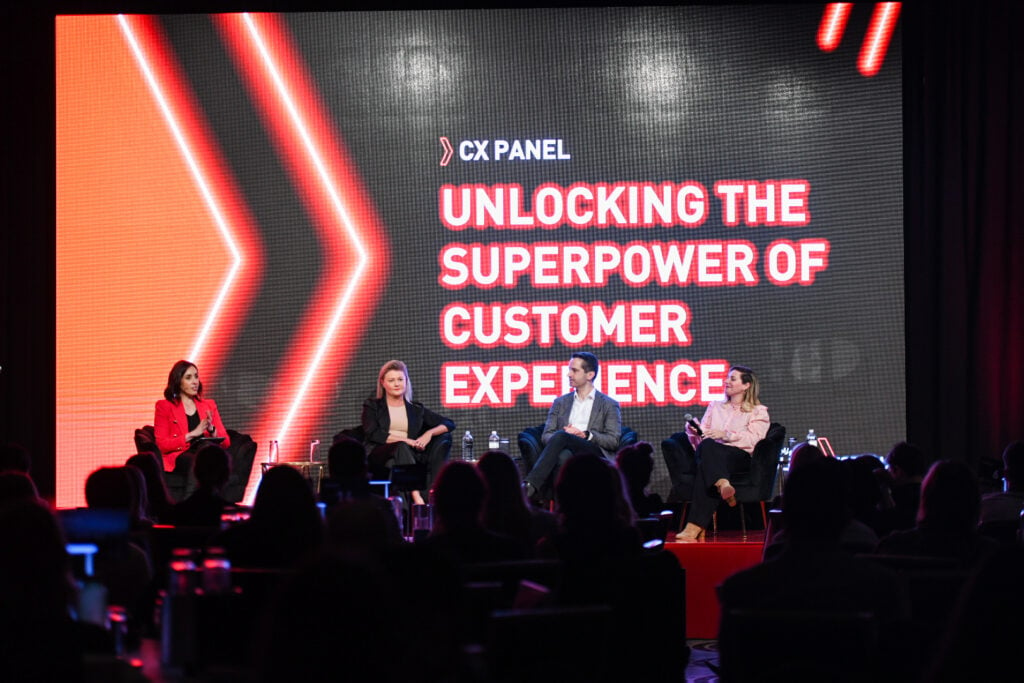
Liana Dubois, Milosh Milisavljevic and Michelle Klein.
Milisavljevic spoke about how Medibank turned pain points into innovative experiences that added value and differentiated the brand.
He noted that the brand picked key health experiences, called ‘value drivers’, such as pregnancy, self-diagnosed mental health issues and cancer diagnosis, and developed experiences, services and propositions around those.
“The other is a general well-being experience. We have one of the country’s largest health and wellbeing platforms called ‘Big Better’. We’ll progressively build a lot more value, motivation, options, and insights into how to conquer your health, and you don’t have to go into the health system.”
When asked about what CMOs and marketers should be upskilling their teams in to ensure effective leveraging of CX in the future, Klein said using the methodology of understanding behaviour that already exists, identifying a simple, fast and effective solution, executing and learning from it.
“A great example of this is the safety check on Facebook. That was a behaviour that customers and people were doing after the Nepal earthquake in 2015, posting ‘I’m okay’ and ‘I am safe.’ What they did was build a solution around that to make it easier for people to mark that they were safe in future crises, and that continues today.
“If you take that methodology of understanding behaviour, seeing what’s happening, trying to identify if there’s a match in what you can deliver to enhance that experience, and test and learn as you go. It’s quite simple, and it can lead to effective results.”
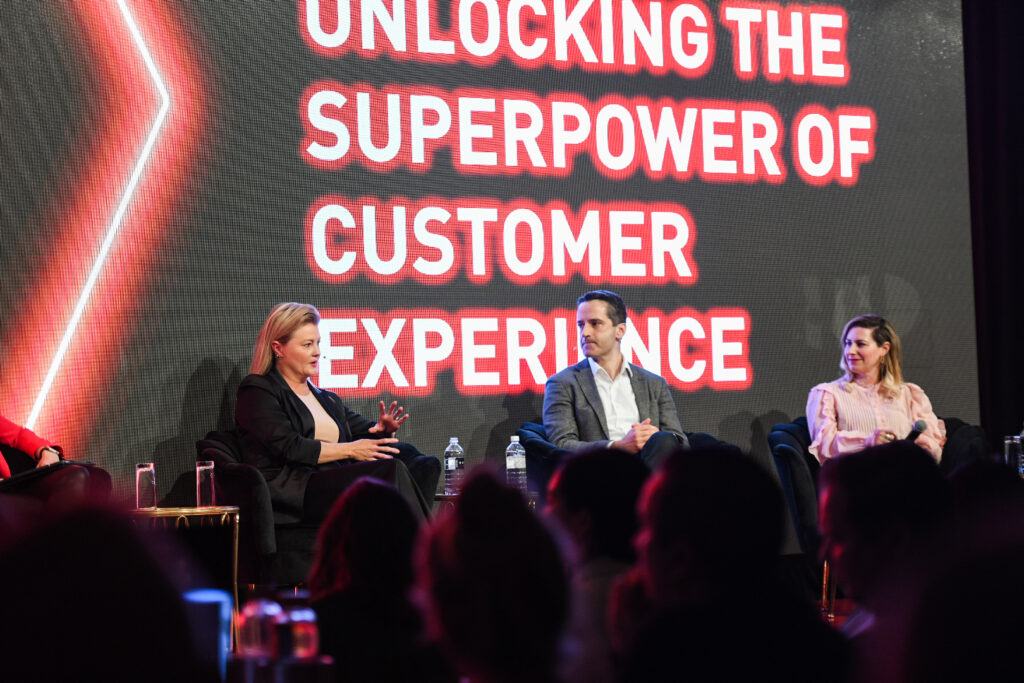
Liana Dubois, Milosh Milisavljevic and Michelle Klein
Joanna Robinson
Joanna Robinson, chief marketing officer of The Iconic, discussed strategies for engaging Gen Y and Gen Z consumers through her work with the e-commerce retailer and at bubble tea franchise Chatime.
Robinson highlighted the importance of understanding Gen Y and Gen Z and noted that by 2033, these two generational segments will represent nearly half of the population in Australia.
She also outlined six key insights into what Gen Y and Gen Z are looking for in brands: understanding them, purpose-led brands, adding value and authenticity, being social first, entertainment, and personalisation.
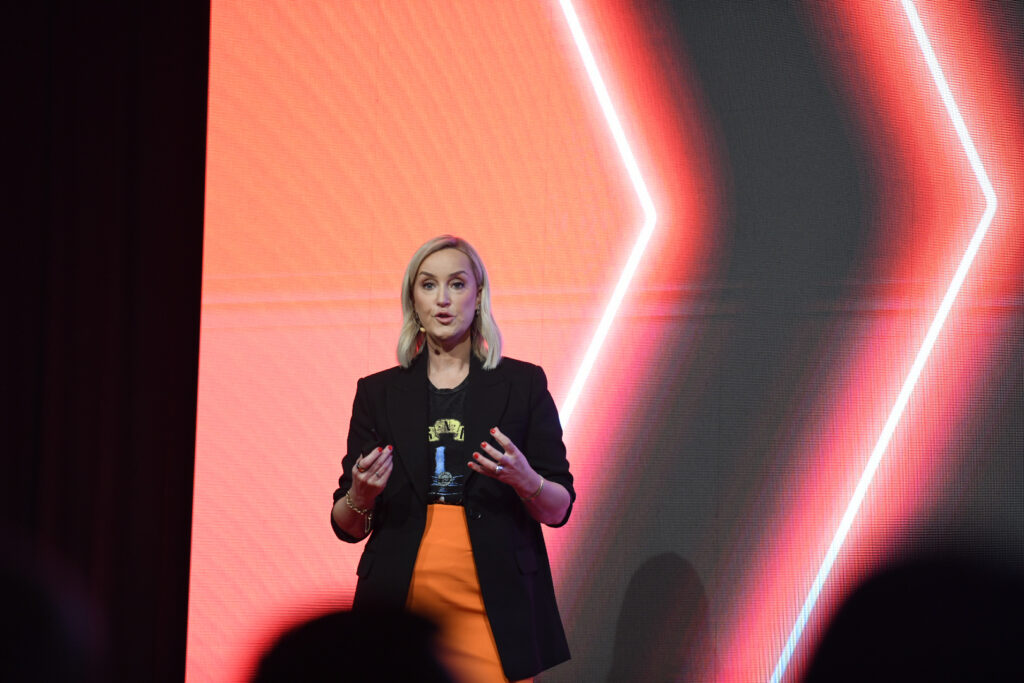
Joanna Robinson
Robinson also stressed the need for brands to stand for something beyond products, such as sustainability and diversity through its initiatives such as People and Planet Positive, and Incubator Program with First Nations designers.
“We know that our customers needs are evolving, and we always need to try to meet those needs. Yes, it’s about digital first. Yes, it’s about driving an emotional connection, and yes, it’s about personalisation,” she said.
Mark Ritson – “I want to draw a big line between formal training in marketing versus all of this guerrilla shit which has no syllabus”
Brand consultant, marketing professor and Marketing Week Mini MBA founder Mark Ritson joined ADMA via livestream with his keynote, Marketing capability crisis: How we fell off the map and how to find out way back.
He talked about the deterioration of marketing quality over the past decade and highlighted a crisis in creativity and effectiveness, noting that only 32% of British marketing teams know the four P’s of marketing – product, price, place, and promotion.
Ritson pointed out that the majority of marketers don’t have formal marketing training. Data he sourced from LinkedIn of people with training in marketing that have marketing in their job title revealed Ireland at the top of the list with 39% of marketers have a training in marketing.
That was followed by Canada, Australia, New Zealand, the US and then the UK with a quarter of marketers have any training and marketing. While he was opened to the different styles of learning, from university to corporate or on the job training, organisational training from a not-for-profit or online courses offered by industry experts.
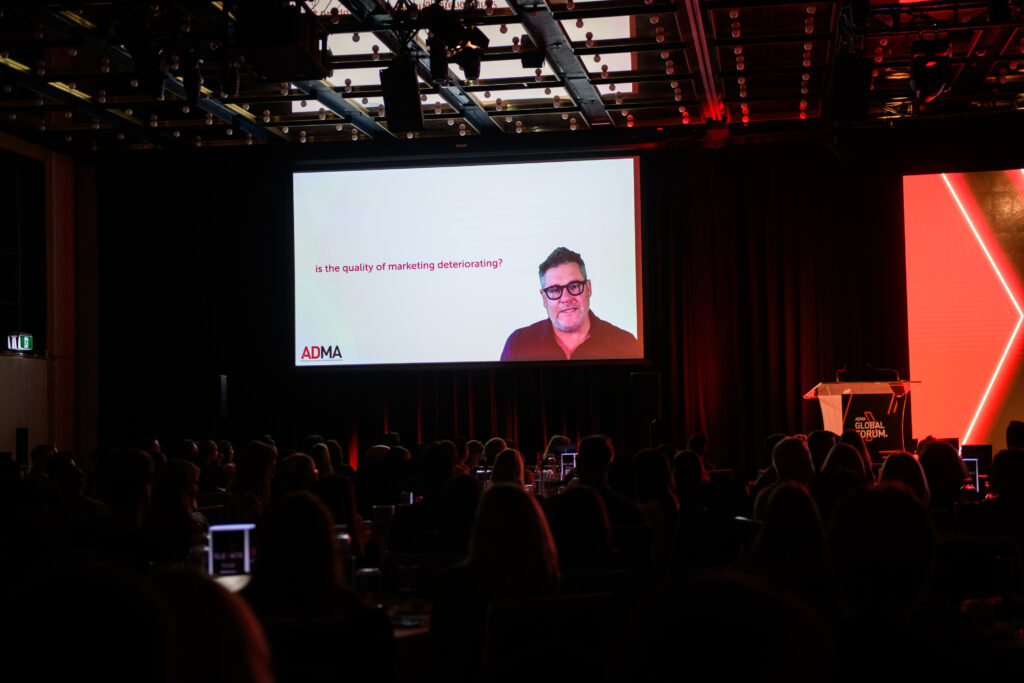
Mark Ritson joining ADMA conference via livestream
“What I don’t mean by training is going on YouTube and picking up shit. I don’t mean listening to Gary Vee speeches of any kind. I don’t mean going on LinkedIn and having debate about shit. I want to draw a big line between what I would call a formal training in marketing. It means done by people who actually are qualified to train and teach, versus all of this guerrilla shit which has no syllabus, which has no pedagogy, and often just takes you down a particular line to a particular intellectual ghetto without any clear approach.”
Ritson’s solution: the newly launched Capability Compass, which aims to address the need for continuous skills development in an industry marked by rapid technological advancements and changing market demands.
“There’s good training and there’s bad training,” he said. “We need to be able to more quickly and and efficiently work out what is what, and work out which courses are right for which companies and which people, and ultimately, make marketing better in the companies that give a shit about it, not because it’s a charity, not because it’s the right thing to do. Ultimately, marketing is a wonderful corporate function that will make most organisations much stronger if it’s done better.”
Lucinda Barlow – “self deprecation is a shortcut to humility and likeability”
Lucinda Barlow, head of international marketing at Uber, took to the ADMA stage to talk about the brand’s pop cultural shift, the impact of self-deprecating humor on Uber and the role of brands in pop culture.
For Barlow, self-deprecating humor was keys to Uber Eats success after losing 85% of global mobility business to COVID-19.
“(Self deprecating humor) is a very specific form of humor that Australians have mastered as part of our culture. There is so much power in laughing at yourself. It’s a great level leveler. It breaks down barriers. It brings people in on the joke.
“Self deprecation is a shortcut to humility and likeability, and so Uber Eats leverage shameless good old Aussie self deprecation brought to life by celebrities willing to laugh at themselves and laugh at the very tropes and constructs of advertising.
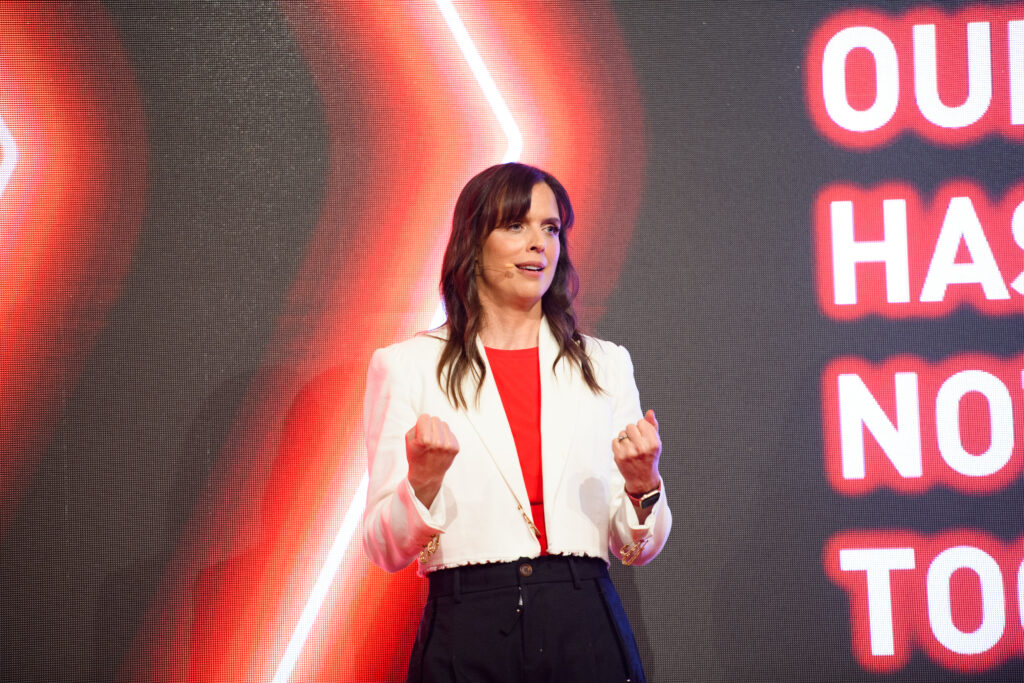
Lucinda Barlow
“It reminded people why they should like us, and that makes sense, because Aussies are some of the funniest people on the planet. We know how to laugh at ourselves,” she added.
Barlow noted that other markets wanted in on the success an the unique tone of voice and campaign construct codified across North America and Asia Pacific markets.
“Eventually, self deprecating humor became adopted as the default global tone of voice for Uber Eats, and even Uber in many markets,” she added.

